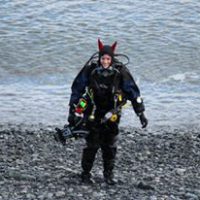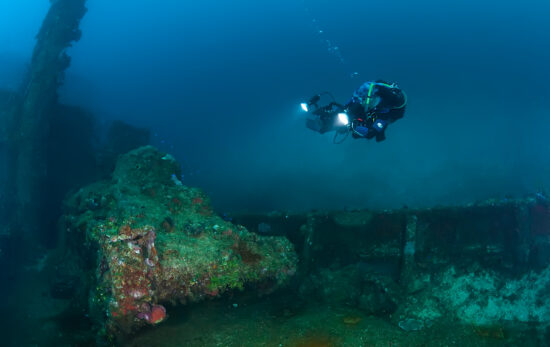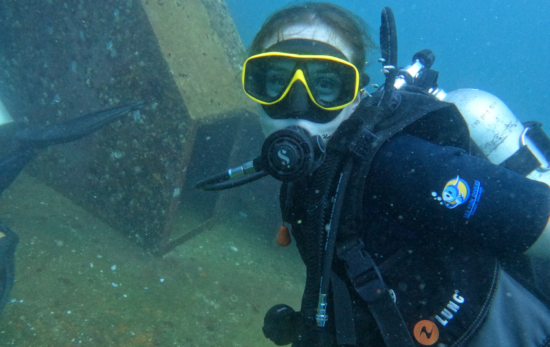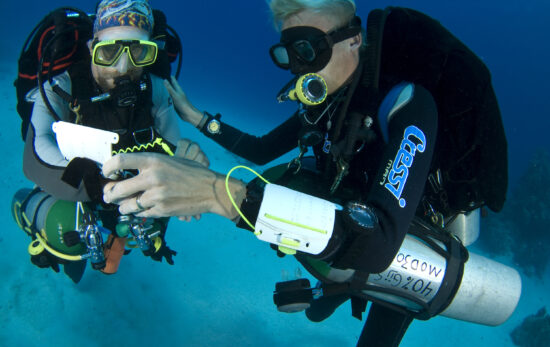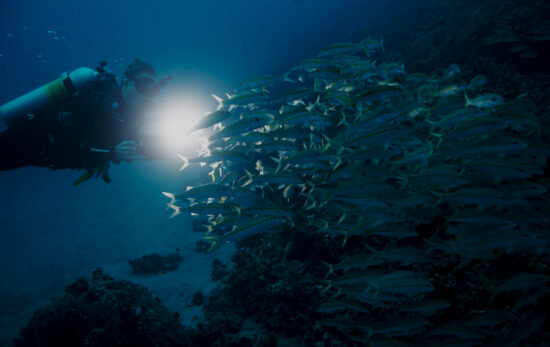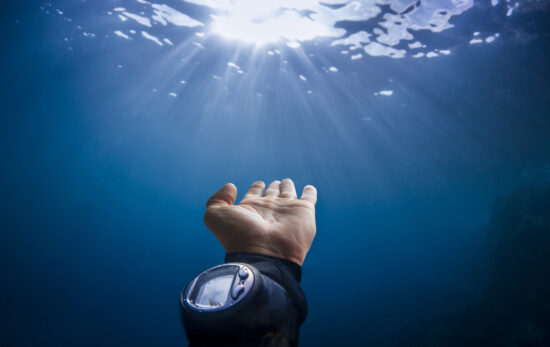Learning to dive transcends borders and languages. If you’re diving into the PADI Open Water Diver course on your next vacation, then knowing some basic scuba diving translations can help you connect with the local dive community and fellow travelers – whichever language they speak.
Indeed, scuba divers come together from across the world to share their common passions, from exploring shipwrecks and photographing marine life to protecting our oceans. Learning just a few scuba diving translations can really boost your travel experience and make your new underwater adventures even more unforgettable.
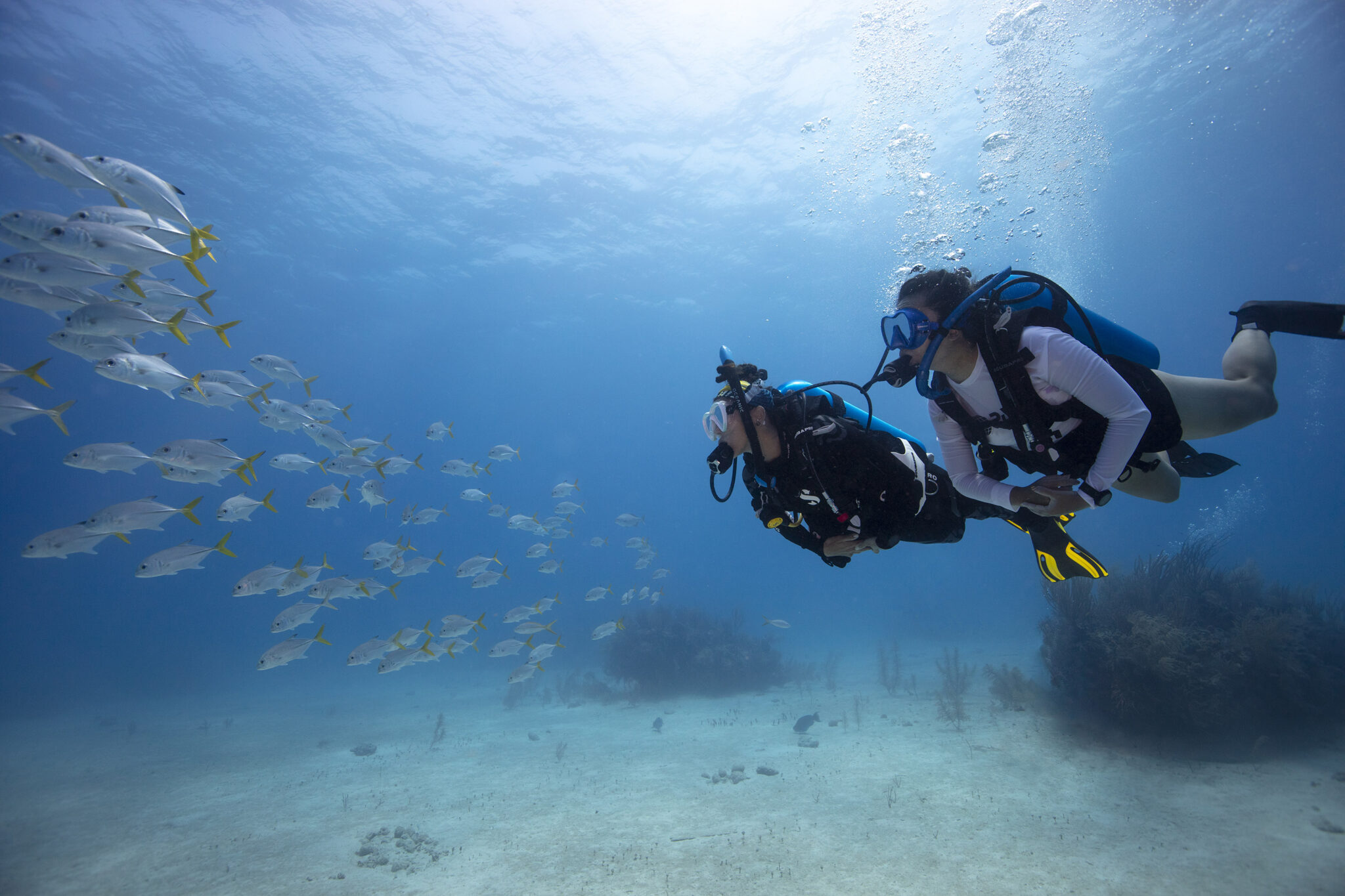
How To Say “Scuba Diving” in Different Languages
More than 7,000 languages are spoken around the globe, which means there are a lot of different scuba diving translations. To narrow things down, let’s start with how to say “scuba diving” in the 27 languages available (besides English) for PADI Open Water Diver course online:
- Arabic: الغوص (al-ghaws)
- Chinese (Simplified): 水肺潜水 (shuǐ fèi qiánshuǐ)
- Chinese (Traditional): 水肺潛水 (shuǐ fèi qiánshuǐ)
- Croatian: Ronjenje s bocama
- Czech: Potápění s přístrojem
- Danish: Sportsdykning
- Dutch: Duiken
- Finnish: Laitesukellus
- French: Plongée sous-marine
- German: Gerätetauchen
- Greek: αυτόνομη κατάδυση (aftónomi katádysi)
- Hebrew: צלילה (tzlilah)
- Hungarian: Könnyűbúvárkodás
- Indonesian: Selam scuba
- Italian: Immersione subacquea
- Japanese: スキューバダイビング (sukyūba-daibingu)
- Korean: 스쿠버 다이빙 (seukubeo daibing)
- Malay: Selam skuba
- Norwegian: Sportsdykking
- Polish: Nurkowanie ze sprzętem powietrznym
- Portuguese: Mergulho autônomo
- Russian: плавание с аквалангом (plavaniye s akvalangom)
- Spanish: Buceo
- Swedish: Sportdykning
- Tagalog: Scuba diving
- Thai: การดำน้ำสคูบา (kār dả n̂ả s̄kū bā)
- Turkish: Scuba dalışı
By the way, if you’re not sure how to pronounce any of these scuba diving translations, then pop them into Google Translate to hear a native speaker say them aloud.
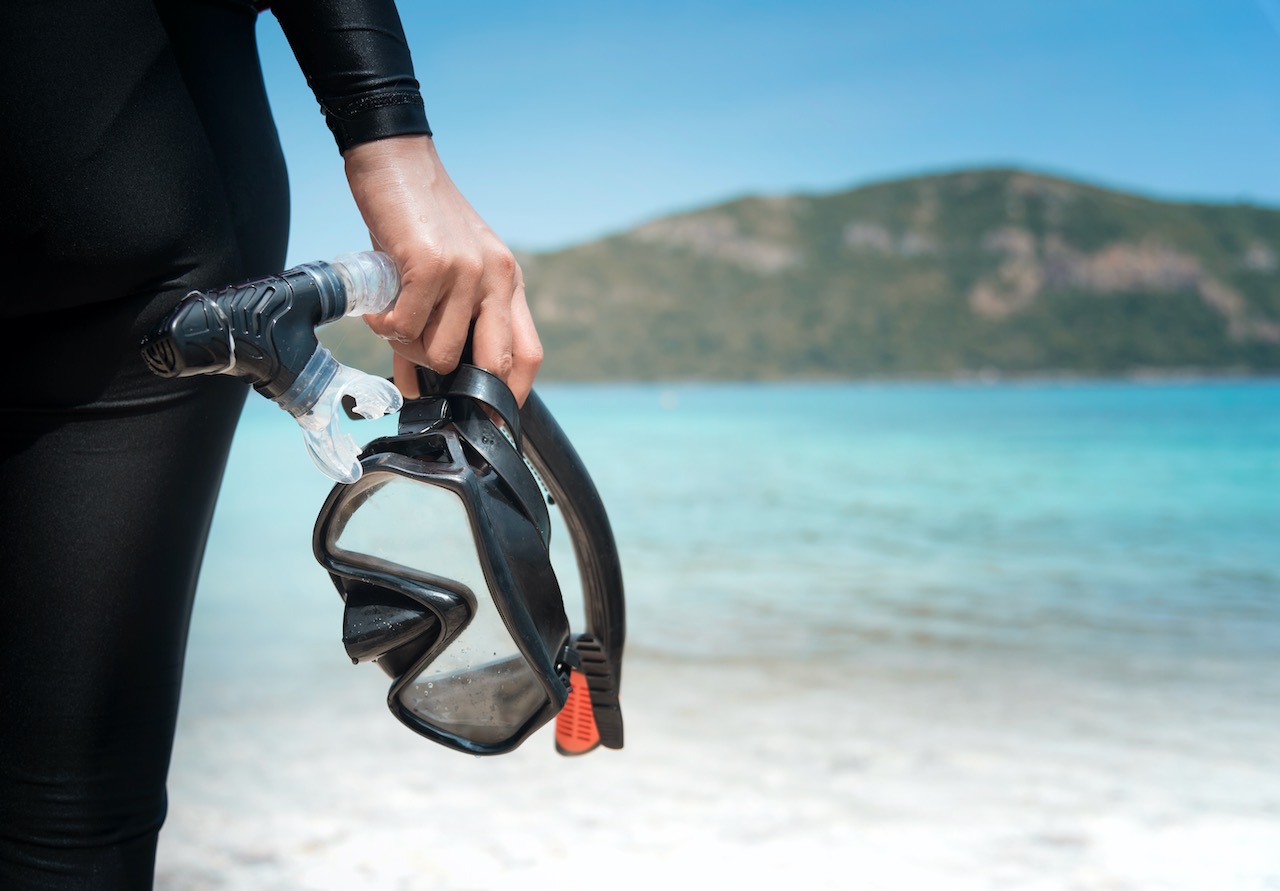
A Few More Scuba Diving Translations
Knowing how to say your (soon-to-be) favorite pastime in multiple languages will almost certainly impress your friends. Beyond that, here are some more scuba diving translations that might be handy to know during your next vacation.
Firstly, you may want to introduce yourself as someone’s dive buddy. Most languages use a literal translation, such as German (tauchpartner/tauchpartnerin), Dutch (duikbuddy), and Indonesian (mitra selam). Similarly, in Arabic it’s “zamil ghaws” (زميل غوص), and in Thai you’d say “bạddī̂ dả n̂ả” (บัดดี้ดำน้ำ).
Next up are a few translations for scuba diving gear.
Mask, fins, and snorkel:
- Maska, peraje, i disalica (Croatian)
- Dykkermaske, svømmefødder, og snorkel (Danish)
- Maske, Flossen und Schnorchel (German)
- Topeng, sirip, dan snorkel (Malay)
- Masque, palmes, et tuba (French)
Scuba tank:
- Bombola subacquea (Italian)
- Dykflaskor (Swedish)
- シリンダー / shirinda (Japanese)
- Dykkeflask (Norwegian)
- Cilindro de mergulho (Portuguese)
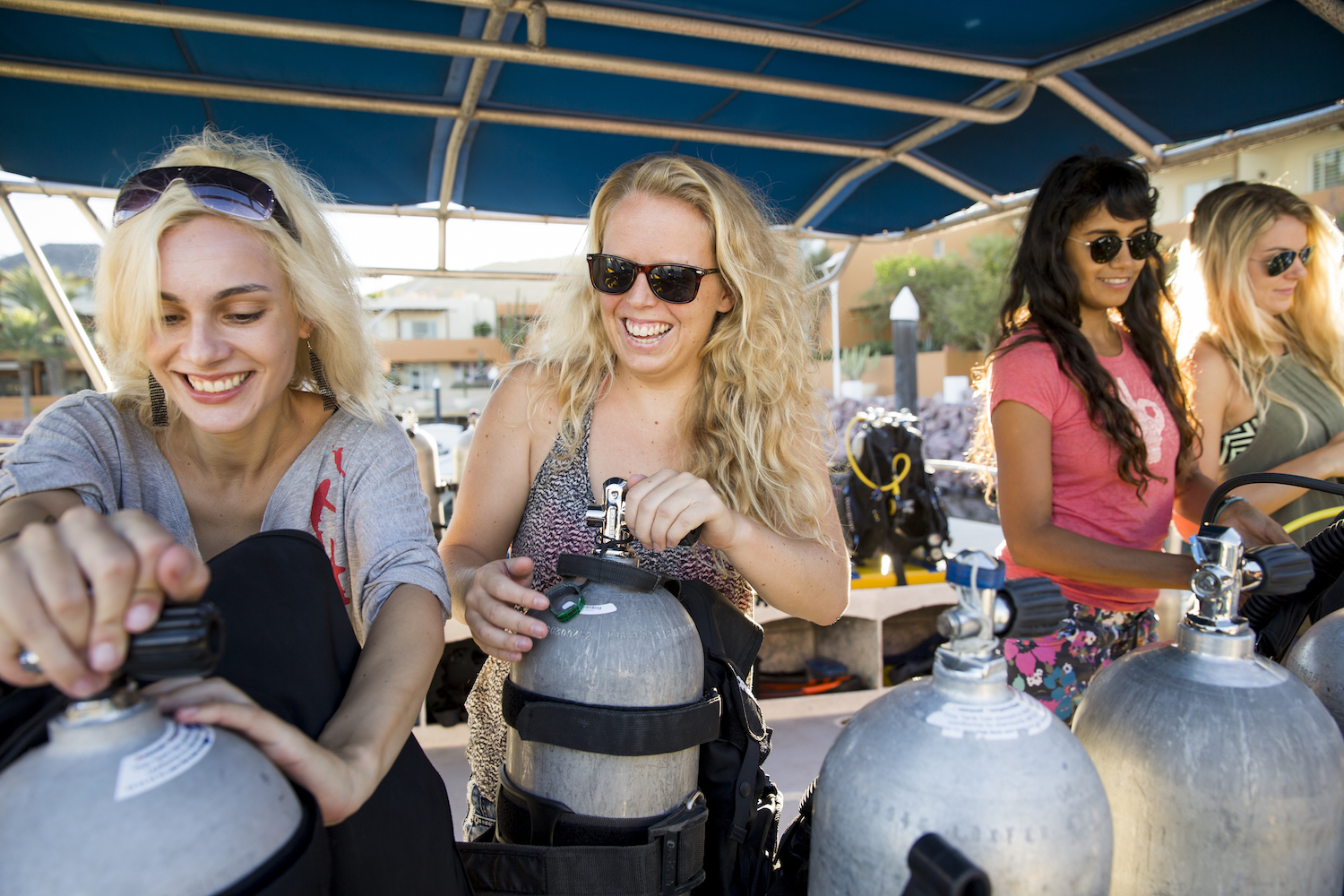
Regulator:
- Sukellussäädin (Finnish)
- וסת צלילה / vst tslylh (Hebrew)
- Légzőautomata (Hungarian)
- Ρυθμιστές Αναπνοής / rythmistés anapnoís (Greek)
Wetsuit:
- 潛水服 / qiánshuǐ fú (Traditional Chinese)
- 潜水衣 / qiánshuǐ yī (Simplified Chinese)
- 웨트슈트 / weteusyuteu (Korean)
- Mokry skafander (Polish)
- Mokrý oblek (Czech)
Finally, after you’ve completed your PADI Open Water Diver certification, you’ll want to tell people, “I’m a scuba diver.” In Turkish you’d say “ben bir Scuba Dalgıcıyım”, while the Russian translation is “ya daiver” (Я дайвер). Some languages depend on grammatical gender, such as in Spanish: soy buceador (masculine) or soy buceadora (feminine).

Fun Marine Life Translations
As you’d expect, as well as scuba diving translations, there are hundreds more translations for the ocean’s different marine creatures.
In some cases, their literal meanings in English can also be pretty amusing. For instance, hermit crab in French (bernard-l’hermit) is “Bernard the Hermit”, while the Swedish word for turtle (Sköldpadda) translates to the rather apt “Shield Toad”.
Occasionally, sea creature translations share the same meaning across many languages, usually influenced by how they look or behave.
| Sea Creature | Literal Translation | In Languages Such As… |
| Octopus/Squid | Ink Fish | German, Finnish, Swedish, Thai |
| Sea Urchin | Sea Hedgehog | Spanish, Malay, Italian, Danish, Arabic |
| Manatee | Sea Cow | Turkish, Chinese, Norwegian, Polish, Korean |
| Jellyfish | Medusa | French, Russian, Portuguese, Croatian, Greek |
| Seal | Sea Dog | Dutch, Czech, Indonesian, Hebrew |
Meanwhile, other marine life translations might be more unique. For example:
- Japanese for dolphin (イルカ / iruka) means “sea pig”
- Arabic for jellyfish (قنديل البحر / qandīl al-baḥr) means “sea lantern”
- Korean for sturgeon (철갑상어 / cheolgabsang-eo) means “armored shark”
- Traditional Chinese for lobster (龍蝦 / lóngxiā) means “dragon shrimp”
- Tagalog for dolphin (lumba-lumba) means “race-race”
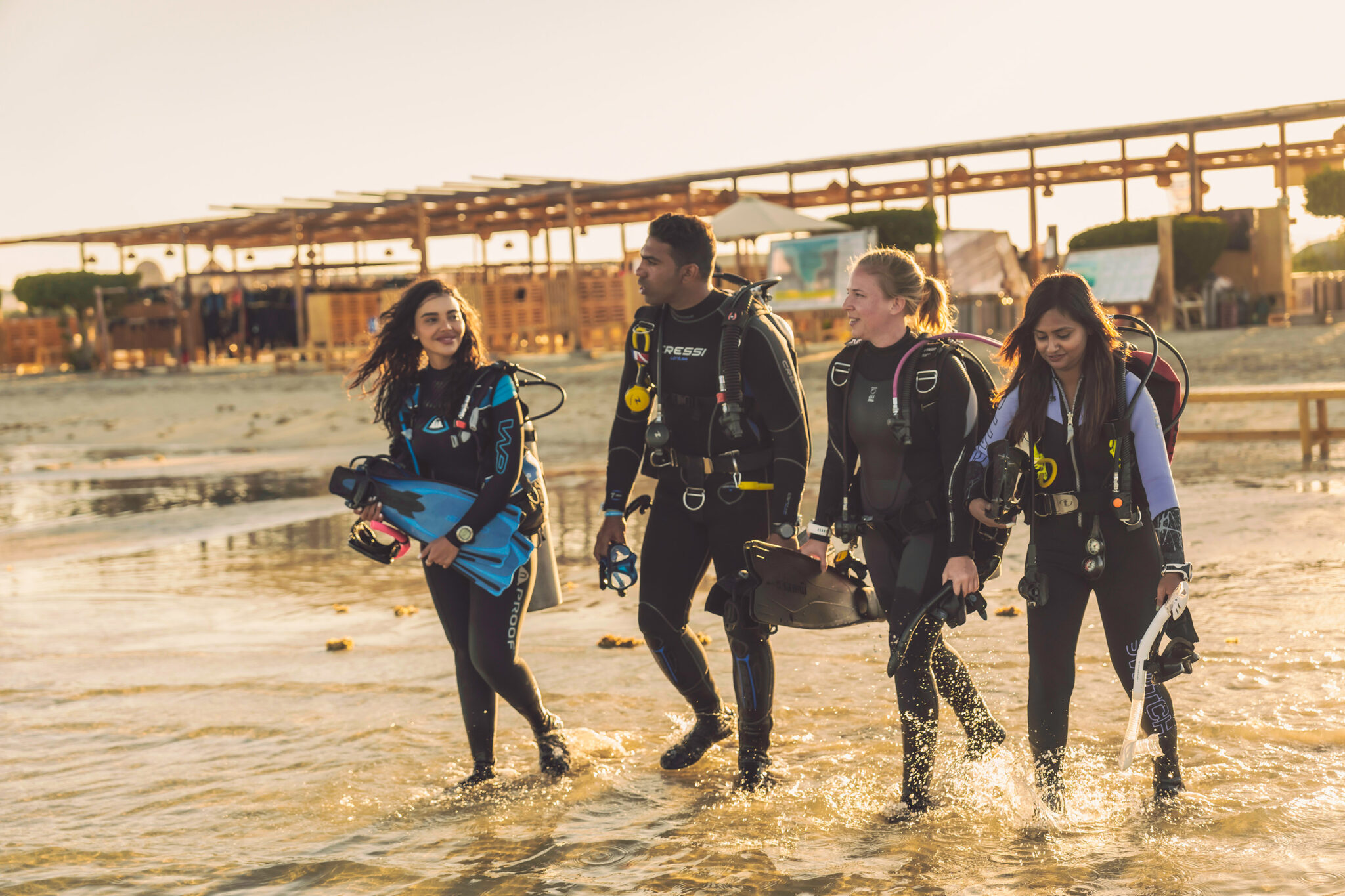
How To Learn Scuba Diving Translations
The best way to learn scuba diving translations (or, in fact, any language) is to immerse yourself. When you travel to foreign countries, you’ll quickly pick up new phrases as people speak them or you read them on local signs. What’s more, you’ll get to experience scuba diving vocabulary and cultures from all over the world!
Whether you’re at home or away, a phrasebook or language-learning app can help you understand words you’re not familiar with. You could also learn scuba translations by browsing PADI’s content:
- Use the top right-hand menu to switch languages while reading this blog or PADI.com
- Watch scuba diving videos in different languages
- Connect with divers around the world on Facebook and Instagram
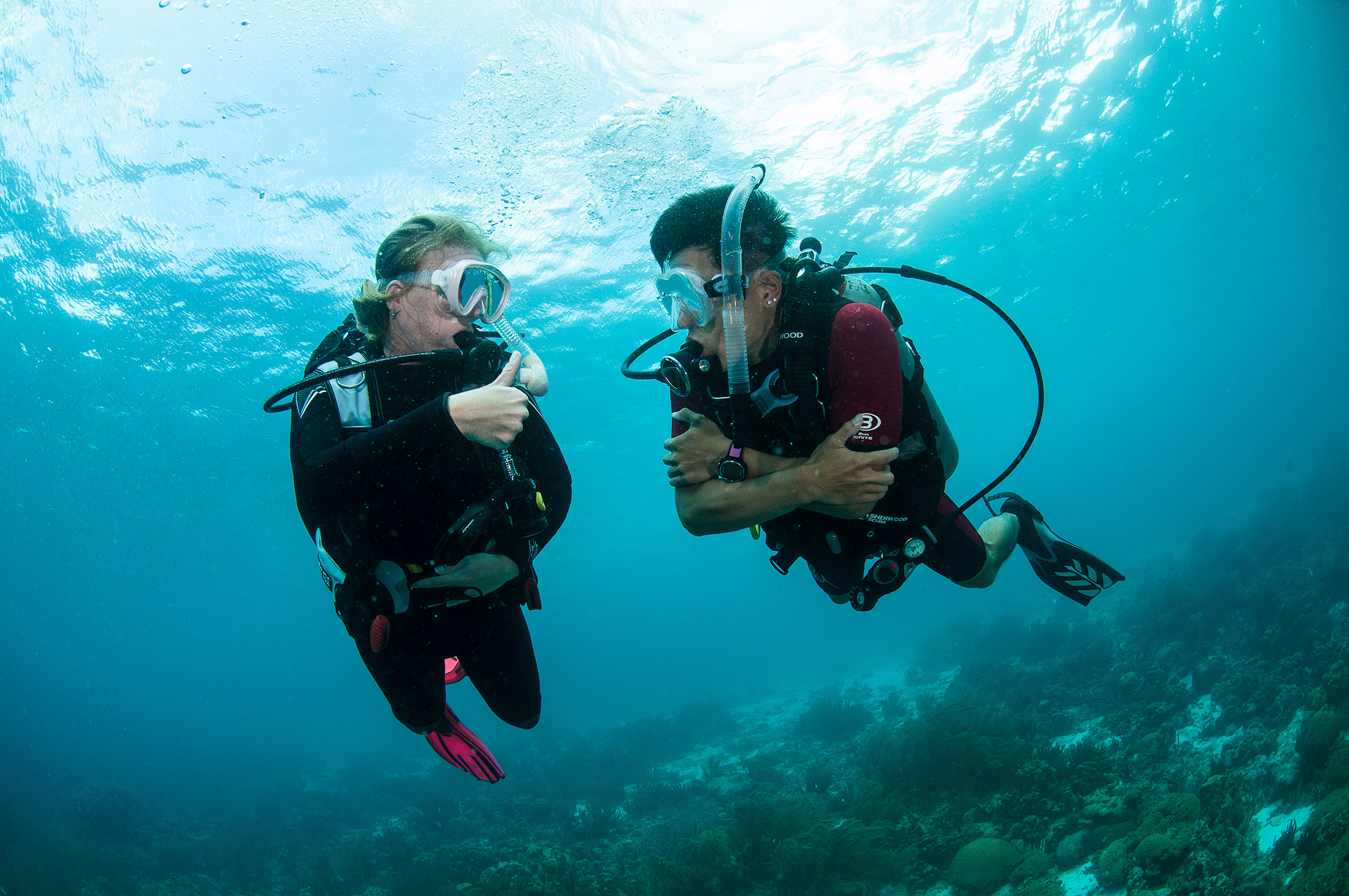
Use Hand Signals for Scuba Diving Translations
During your PADI Open Water Diver course, you’ll master basic scuba hand signals so you can “talk” to your buddy while you’re underwater. You can also point out marine life to each other! This often develops into being able to have entire conversations without speaking a word – a skill that’s also useful above the waves and in every corner of the planet. Next time you struggle to find the right scuba diving words, try using a hand signal instead!
Live Unfiltered – Become a Scuba Diver
Of course, learning the correct scuba diving lingo is only the beginning. Now that you know how to say “scuba diving” in multiple languages, why not take the plunge and experience the underwater realm firsthand?
Indeed, there’s no better way to immerse yourself in a deeper purpose than with the ocean’s classroom. Becoming a certified diver unlocks transformational travel experiences and a lifelong passport to unfiltered, undersea adventures.
